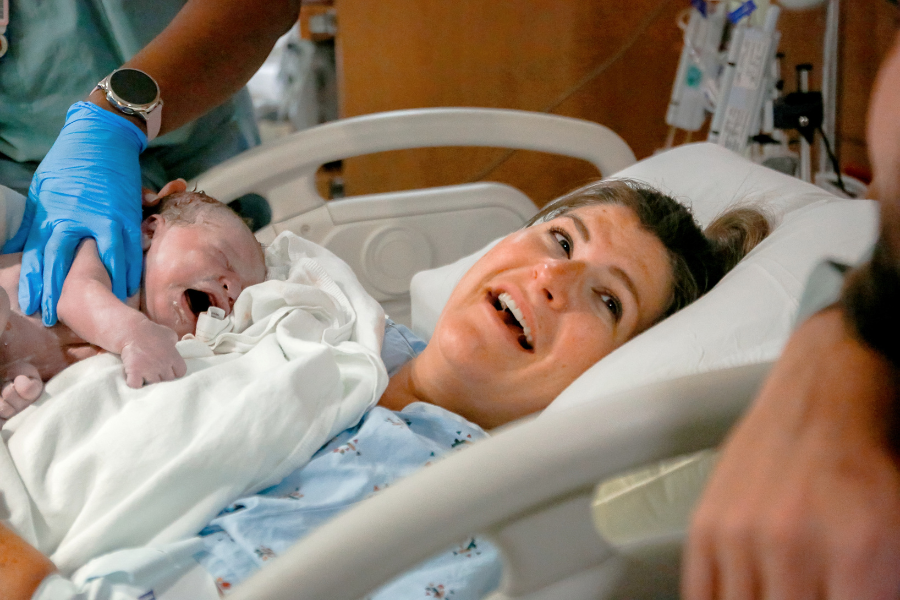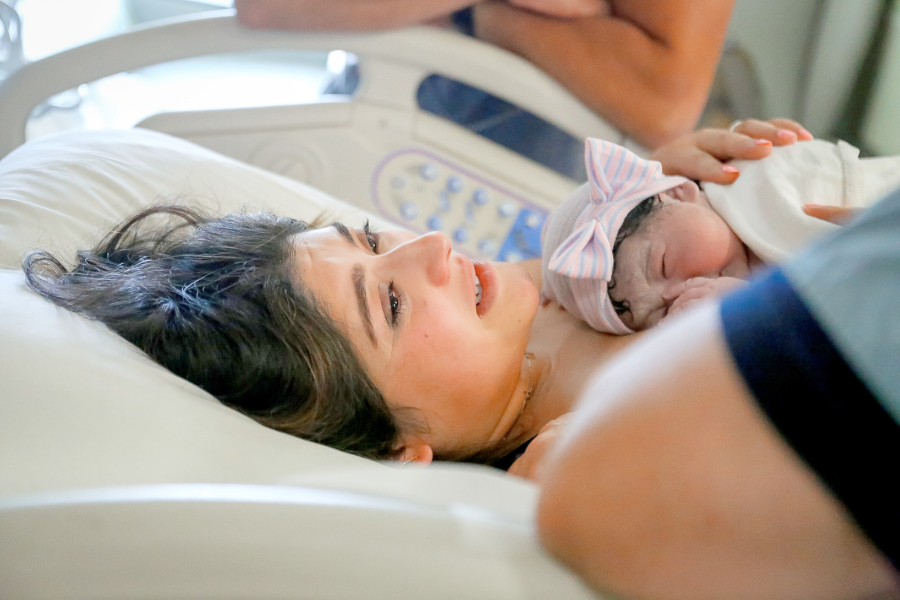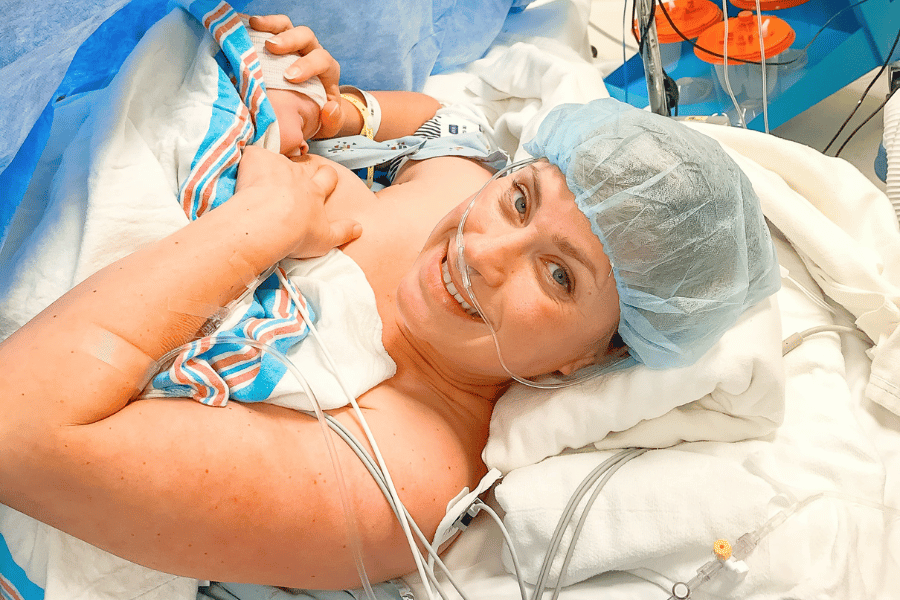I’ll go ahead and speak for everyone on this, nobody likes a headache. I’ll venture to say that headaches in pregnancy are even more disliked!
Depending on the severity they are annoying, debilitating, somewhere in between, or all the above.
There are valid reasons why the frequency of headaches might increase during pregnancy. This doesn’t mean you have to sit back and endure them…or that you shouldn’t investigate further, especially if other symptoms accompany them.
To help you better understand headaches in pregnancy, including when to worry and how to deal with them, I have put this article together for you to read and learn.
Follow @mommy.labornurse on Instagram to join our community of over 650k for education, tips, and solidarity on all things pregnancy, birth, and postpartum!
Common causes of headaches in pregnancy
Whether pregnant or not, it can be difficult to pinpoint one exact cause of a headache.
Hormones
Hormones have a way of doing some pretty wild things to us. While hormones alone probably aren’t to blame for headaches in pregnancy, they definitely can be a contributing factor.
For a lot of women, pregnancy headaches are more common in the first trimester. The hormonal shift in the first trimester is pretty drastic so headaches, among other things, might be more noticeable then.
Dehydration
Another fairly common cause of headaches in pregnancy is dehydration. Water consumption is obviously super important for everyone but even more important during pregnancy. What’s more, your water intake requirements are a bit higher during pregnancy too.
It basically boils down to this – drink as much water as needed to keep your urine pale yellow or clear in color. This is usually around 10 glasses a day but depending on your activity level, the climate where you live, and the season, it might be more.
Stress
This is another that’s the culprit for headaches in both pregnant and non-pregnant people. Let’s be honest, pregnancy is a very exciting time for a lot of women but it also can be a very stressful time too.
Not getting enough sleep
I had bad pregnancy insomnia so I feel this one big time. Getting good quality sleep during pregnancy is hard! It becomes exceptionally difficult in the third trimester when your belly is bigger and everything just hurts.
I so hope you are one of the lucky ones that doesn’t experience pregnancy insomnia but if you do, check out my post below for some tips.
Caffeine withdrawal
Despite what a lot of (non-pregnant) people say, you don’t have to completely eliminate caffeine during pregnancy. According to ACOG, “moderate caffeine consumption (less than 200 milligrams per day) does not cause miscarriage or preterm birth. (source)
Some women choose to completely give up caffeine during pregnancy while others opt for the moderate caffeine consumption approach. Just know that decreasing or completely eliminating caffeine, once your body is accustomed to a certain amount, might lead to headaches.
Preeclampsia
More to come on this below!
Types of headaches
Most of the headaches you experience in pregnancy are just like those you might experience outside of pregnancy. Here are a few of the different types of headaches:
Tension headache
The most common type of headache, described as a “tight band” around or squeezing of the head, tight neck and shoulder muscles, possible sensitivity to sound and light.
Sinus headache
Typically occurs with a sinus infection, pressure sensation around the eyes, forehead, and cheeks, usually worse with lying down or bending forward.
Migraine
Severe throbbing and pulsing typically on one side of the head, usually accompanied by extreme sensitivity to sounds and light and nausea and vomiting, some people experience an aura (warning symptom), might last hours or even days.
Preeclampsia-related headache
Occurs in pregnancy, described as a dull or severe throbbing pain that won’t go away, might be accompanied by visual disturbances, a sudden weight gain, and/or a sudden weight gain.
Spinal headache
A very rare but potential side effect from an epidural or spinal anesthesia, severe headache that is worse when sitting up, can be accompanied by dizziness, blurry vision, ringing in the ears, or nausea, might resolve on its own but might require hospital treatment.
When to worry?
Of course, we don’t want anyone to suffer from headaches during pregnancy but there are times when a headache in pregnancy might be concerning. The big thing we worry about with headaches in pregnancy is preeclampsia. Preeclampsia is a serious health problem for pregnant women that is usually characterized by high blood pressure and excess protein in your urine.
Preeclampsia
A mini deep-dive into preeclampsia starts now. Since this article isn’t specifically about preeclampsia I’m just going to hit the highlights.
Like I said, preeclampsia is characterized by high blood pressure and excess protein in the urine. The excess protein indicates that issues are going on with your organs, specifically the kidneys and liver.
Preeclampsia affects about 2-8% of pregnancies worldwide and is the cause of 15% of premature births in the U.S. If left untreated, preeclampsia can have some serious negative outcomes for both mom and baby. Fortunately, when caught early, and with appropriate treatment, most women go on to have healthy babies.
In addition to the headache that just won’t go away, you might also experience elevated blood pressure, spots in your vision, a sudden jump in weight, excessive swelling (especially in the face or hands), and pain in your right upper belly.
If you are diagnosed with preeclampsia you can expect to be monitored closely during the reminder of your pregnancy. Your treatment plan will depend on the severity of your symptoms and how your baby is growing but it might involve the recommendation of a medical induction at some point.
That’s about as condense as I can make this topic but if you are looking for more about preeclampsia and gestational hypertension, you can find it in my article below!
Related Reading: An L&D Nurse Discusses Gestational Hypertension and Preeclampsia
How to manage headaches in pregnancy
Management of headaches in pregnancy really depends on the cause. While you can’t change the hormonal shifts that occur during pregnancy, you can focus on hydration, prioritize healthy sleep habits, equip yourself with stress management techniques, and educate yourself on things that may be concerning (like you are doing by reading this article!)
I have included some information about hydration and pregnancy-related insomnia above and will include some additional resources below.
Tylenol use during pregnancy gets a bad rap but it is safe. As long as you take it as directed, only when needed, and your OB provider hasn’t advised you otherwise, go for it. There is no reason for you to sit around and suffer when there is a perfectly good and safe option out there for you.
Another option to cope with headaches is this amazing product I found on Amazon! The TheraICE migraine relief cap is seriously magical. This cold compression cap offers all-around cooling and therapeutic relief by targeting certain areas for a faster recovery. You won’t be sad you invested in this product, just trust me.
Wrapping up
I hope you have a better grasp on headaches in pregnancy, when you should be concerned, and how you can cope with them. The bottom line? Familiarize yourself with the signs and symptoms of preeclampsia (without totally freaking yourself out) and don’t be afraid to put your foot down and kindly demand more answers if something feels off.
Like I said, I have scattered some helpful resources throughout the article but will leave you with a few, additional, pregnancy and birth related resources below. I’m all about knowledge = power, hints the Mommy Labor Nurse platform. But in all seriousness, the more you know, the more you know, and the better equipped you are to advocate for yourself if and when the time comes.
Cheers to an even better birth, mama!





